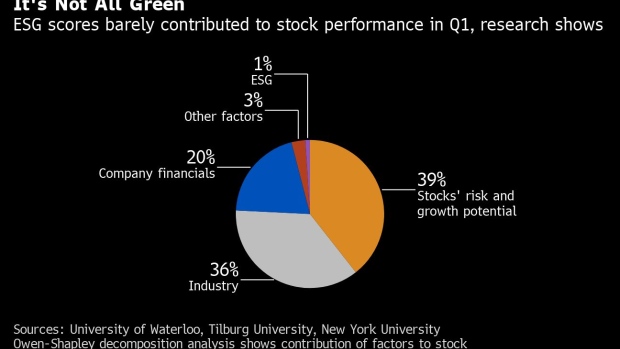Sep 1, 2020
Research Casts Doubt on ESG’s ‘Widespread’ Outperformance Claims
, Bloomberg News

(Bloomberg) -- The notion that socially responsible investing is beating the overall stock market this year is starting to come under fire from academics and market observers, who say it may be better to stick with more traditional metrics.
U.S. equities with higher scores on environmental, social and governance metrics didn’t actually sustain smaller losses during the pandemic-triggered selloff in the first quarter of 2020, according to research by the University of Waterloo, Tilburg University and New York University’s Stern School of Business. The study found that ESG scores were negatively associated with returns during the market’s recovery in the second quarter, and that factors including leverage, liquidity and intangible assets had bigger roles to play in returns.
“Contrary to widespread claims, ESG is not an important determinant of crisis period returns,” the researchers led by Elizabeth Demers of the University of Waterloo wrote in the paper dated Aug. 27. ESG scores don’t offer any “meaningful” predictive power to help discriminate between a crisis period’s winners and losers, they added.
The global push into ESG investing has gathered pace this year as governments channel virus-related recovery funds into health and environmental projects. Equity and bond funds with ESG mandates attracted at least $100 billion in the year through August 6, according to EPFR data. The S&P 500 ESG Index is up 11% this year, beating the benchmark S&P 500 by about three percentage points.
Asset managers including BlackRock Inc. and Allianz Global Investors have touted the performance of their ESG investments as a shield against volatility and price declines. Morningstar Inc. went as far as to call sustainability an “equity vaccine,” not only helping funds weather the hit from the coronavirus but also charting a course for future market success.
Read: Fidelity, BlackRock Reject Trump Limits on 401(k) ESG Investing
The academics’ study contradicts such claims. Using statistical analysis of ESG scores and the performance of more than 1,600 U.S. stocks, the researchers found that ESG was responsible for only 1% of the total explained variation in January-March and up to 3% in April-June.
Cash levels, another theme that has been a favorite of investors this year, are actually a better guide to a company’s prospects, along with “innovation-related assets” such as a company’s own internal research and development, according to Demers and her colleagues.
In a separate recent report, Jefferies Financial Group Inc. found that while applying an ESG filter after stocks were selected added an average of 2.5% to annual returns on Asian equities over the past five years, integrating ESG criteria into share selection from the beginning had only a limited impact. While it’s true that investors often make ESG investments for reasons other than bottom-line concerns, evidence that they may not be outperforming could impact future investment decisions.
©2020 Bloomberg L.P.